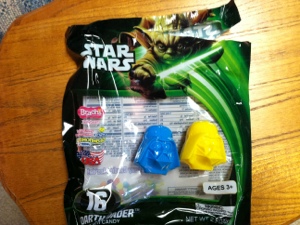Travelin’ Whovian June 21, 2014
Posted by mareserinitatis in family, older son, science fiction.Tags: airline, dr. who, older son, security, travel, tsa, whovian
1 comment so far
The older son travels rather frequently to see family, but he’s had rather lousy luck with TSA. Almost every time he’s gone through security, he’s had something happen. When he was younger, it was often his own fault. For instance, there was the time that he decided to bring some spending money…and had about three dollars in pennies in the bottom of a carry-on. The folks manning the x-ray machine were not happy with him, and he had to fish all the coins out of an exceptionally full backpack.
As he’s gotten older, the incidents have been more innocuous. There was one time where he had too large a container of toothpaste (they threw it away) and another time where he had a nail clipper. (I think I wasn’t flying with him that time, but I had a gate pass as he was flying as an unaccompanied minor. They gave it to the security guard who held it and gave it to me when I returned the gate pass.)
Today, he flew out again (from Fargo, which is a rather small airport) and had yet another fiasco with security. Apparently TSA noticed something in his carry-on as it passed through x-ray. I was actually waiting near the entrance to security (no gate pass this time) and he was about 100 ft. away. I could see something had happened with his bag and there was TSA agent riffling through it…and older son didn’t look happy. Finally, the agent reached in and pulled out…the older son’s sonic screwdriver.
From the look on the agent’s face, it was very apparent he had never seen an episode of Dr. Who in his life. He was holding it in front of himself, quite gingerly. I could easily see the furrowed brows and potential fear in this guy’s face, even 100 ft. away. He was obviously thinking, “What this hell is this thing?!” And I burst out laughing, definitely out loud. I’m sure the security guard next to the exit gate, along with everyone else standing near me, must’ve thought I was disturbed.
Fortunately, however, the screwdriver was returned and the older son made his flight…just barely. Maybe next time he’ll bring a banana instead. They’re a good source of potassium, you know…and, well, TSA probably won’t freak out over that.
I still haven’t figured out why the older son had a sonic screwdriver in his carry-on to begin with.
Never tell me the odds November 6, 2013
Posted by mareserinitatis in science fiction, younger son.Tags: science fiction, star wars, wisdom, younger son
add a comment
As I was explaining (complaining?) to the older son about the odds of some particular favorable event happening, the younger son, who was playing a video game and didn’t even bother looking up from the computer, piped up with this little gem:
You know, he’s a smart kid. If Han Solo hadn’t attempted to outrun the Empire, the most likely outcome would’ve been capture. Of course, I suppose he didn’t see the getting encased in carbonite thing as a potential outcome.
Fortunately, I don’t anticipate that any outcome will result in carbonite encasement regardless of the success or failure of my attempts.
The great Easter Egg Hunt of 2013…or May the force be with you. March 31, 2013
Posted by mareserinitatis in family, science fiction.Tags: easter, holiday
add a comment
A few of you may remember two years ago when I discovered some geologically questionable Easter eggs. This year’s Easter celebration was just as unique. You see, I found these:
I told the kids that their Easter eggs would be unique, and they got a single hint. At that point, I began playing the Star Wars soundtrack. They were puzzled until they found the first “egg,” at which point they were amused. I think they found them all before we’d gotten to the Imperial March.
Friday Fun: For all the Stars Wars Geeks April 27, 2012
Posted by mareserinitatis in Friday Fun, science fiction.Tags: science fiction, star wars, video
2 comments
Lexile ranges December 19, 2011
Posted by mareserinitatis in education, gifted, homeschooling, older son, science fiction, societal commentary, teaching, younger son.Tags: books, gifted, gifted education, lexile range, older son, reading, younger son
add a comment
The younger boy’s school sent home a bunch of information on lexile range. I’d never heard of this before, but it’s a way to rate books so that kids are reading at an appropriate level. On the surface, it seems like a good idea: it’s very hard, as a parent, to provide reading material for your kids that’s appropriate. Aside from the basic issues of whether they’ll understand the language and sentence structures of a book, there are the themes and situations: are they too complex or adult-oriented for a child to read?
A lot of this, of course, depends not only on cognitive ability but emotional maturity, as well. I remember how my older boy started reading Harry Potter very early. Sometime in third grade, he read the fifth book. I began to wonder about him reading the fourth and fifth books at such a young age because of the adult themes. We were fortunate, however. Reading books about such emotional and adult themes started giving him words to explain a lot of his thoughts and feelings with minimal emotional fallout.
After receiving these results, I dutifully trucked my troops down to the library (no complaints from said troops) where they had a program to help us find books in the appropriate range. However, I forgot the letter with the lexile range and so had to guess where he was at. The younger boy had already been reading Magic Tree House books, so I figured some of the Dragon Slayer Academy books might be up his alley. We got those and some Bionicle books and headed home. He really seemed to like the Dragon Slayer Academy books and has been reading bits at a time. Language-wise, they seemed perfect, although their length is a bit intimidating for him.
It turned out, I had remembered the incorrect values. The books we picked were near the top of his range. And yet, I was confused. If these were supposed to be too difficult, why was he having no difficulty reading them?
Mike, unbeknownst to me, had also started looking at lexile information on specific books. He was curious where he would’ve been placed when he was in various stages of school. After we returned from the library, he started telling me about this and that he didn’t buy the results. He’d been comparing some of his favorite sci-fi books, and he was puzzled at the results. I threw out some books I read as a kid and made some comparisons. Books that I thought were very difficult showed up as supposedly easier to read than ones I’d zipped through.
We looked up the criteria for determining lexile range:
A Lexile measure does not address the content or quality of the book. Lexile measures are based on two well-established predictors of how difficult a text is to comprehend: word frequency and sentence length. Many other factors affect the relationship between a reader and a book, including its content, the age and interests of the reader, and the design of the actual book. The Lexile measure is a good starting point in your book-selection process, but you should always consider these other factors when making a decision about which book to choose.
Both Mike and I read this and shook our heads. We both had different takes on it. I found that one thing that made a book challenging for me was dealing with vocabulary. It’s not clear to me whether or not this is reflected in the “word frequency” measure. (Do they mean word frequency in the book or relative to the English language?) Mike felt he struggled most with books that had very adult themes, something not reflected in the range.
Our take on this is that this is only a very rough guideline, and probably not a good one to use. We both felt that interest in a book or topic was probably going to be a far better predictor of readability than using the lexile range. I suppose that’s what they’re saying about considering other factors.
My concern in this is that some schools go a bit overboard with these things. When the older boy was in fifth grade, he was going to public school part time. I got a couple calls from the school librarian because he wanted to check out books that were designated for 7th-9th graders. I felt this was silly because he’d been reading at above that level already, and probably had come across themes in his reading that were more adult than what was in those books. I told her it alright for him to check the books out, but she seemed to be very opposed to it. I finally gave up and told older son that he should just probably check most of his books out from the public library.
I’m hoping I don’t see something similar happen with the younger son, i.e., that he not be allowed to check books out from the library if they’re outside of his lexile range. On the other hand, I’m glad that they seem to be promoting reading at the upper end of the scale so that kids will stretch their mental muscles a bit as well as that they make the point that within any grade level, you’ll have a wide variety of reading levels. In other words, it seems like they’re trying to get rid of the fantasy that kids all read at the same level and thus require the same reading level. Therefore, while I may disagree with assessments of individual books, I think they’re definitely taking a huge step in the right direction.
Stargate: another example of the liberal agenda December 23, 2010
Posted by mareserinitatis in family, religion, science fiction, societal commentary.Tags: liberal, stargate
add a comment
One my fondest memories of the younger boy’s toddler years are when he saw our jogging trampoline sitting on its side, so the bottom was exposed. He pointed to it and said, “Wook, Mommy! Targate!” (This of course translates to, “Look Mommy! Stargate!”) As you can tell, I’ve passed my love of sci-fi, and Stargate in particular, onto my kids.
Recently, however, my older boy came up to me and asked, “Mom, do you think Stargate is liberal?” My answer was not particularly, although it certainly has been at times. Apparently someone he knows refuses to watch the show, though, because it’s too liberal.
Since then, I’ve been trying to look at the show and see how it might be interpreted that way. I think the premise of the show is neutral, and being about the military, could even be perceived as conservative. In fact, the show has won awards from the Air Force because of how it represents the military.
Looking at it one way, there is a definite power structure and hierarchy. The whole thing is a big, secret government operation. One of the major enemies ends up being an international oversight committee. They are trying to protect the interests of the US, as well as everyone on Earth.
Things that might be construed as liberal seem to involve the individual teams. I’ll look at SG-1 only, but some of these can apply to the other shows as well. First, while there is a rank and command in the team, the team leader tends to respect and follow the advice of the other team members, making it, in effect, more egalitarian. There is, of course, Daniel Jackson, who is always arguing for a non-military way of handling things. The interaction with aliens tends to be a bit more friendly (at least with friendly aliens) than you might expect.
Is it the notion that what someone perceives as a god might, in fact, be someone who is just more powerful but not necessarily omnipotent? Or the fact that we care about everyone on Earth, and not just the US? That there is the expectation of humanitarian treatment among the aliens with whom the SGC interacts?
The most obvious ‘liberal’ issue was during the last couple seasons, when the Ori showed up. During those seasons, there seemed to be a lot of discussion about religion and its role in politics. There were more than a few times where I remember thinking that much of the dialogue could easily apply to some political situation in the US.
But that was part of the reason I enjoyed the show. While I could easily see myself taking sides with one or another character or viewpoint, most of it was presented as a discussion or conflict between those sides. The answers were seldom cut and dried, and many times when a character did do the ‘right thing’, they ended up face to face with the law of unintended consequences. The real world is messy, and I felt like the show did a good job of showing how muddy the waters can be despite one’s best intentions.
Or is that the problem: shades of grey is liberal?
Perhaps I’m just not getting it, my objectivity out the window because I like the show too much.
What do you think?
That’s why the women are taking over… September 10, 2010
Posted by mareserinitatis in feminism, science fiction.Tags: conventions, science fiction
add a comment
I now understand why we must live in a matriarchy: women are now becoming a significant part of the sci-fi demographic.
I guess it’s too long since I’ve been to a convention because my first thought was, “Really? Other women go to these things, too?” Guess so. Time to whip out the sewing machine…






 I also blog at Engineer Blogs, home away from home to some of the best engineering blogs.
I also blog at Engineer Blogs, home away from home to some of the best engineering blogs.
My theory on the Big Bang Theory January 30, 2012
Posted by mareserinitatis in humor, physics, science, science fiction, societal commentary.Tags: Big Bang Theory, physics, stories, suspension of disbelief, TV
10 comments
I really don’t watch much TV, but I do own all of the Big Bang Theory that’s available on DVD. Most of my friends really enjoy it, too, and I have a theory why that is: I think that it’s one of the few TV shows that nerds can stand to watch because it is far more factually correct than most TV shows.
Most of the nerds I know are the ones who annoy everyone else at movies by making commentary throughout about the impossibility or improbability of what they’re witnessing. (In particular, my older son is this way. Of course, he also likes to tell you what’s going to happen next, so he’s been banned from speaking during movies.) Suspension of disbelief becomes a little harder when you’re faced with something you know cannot possibly happen.
I think this became obvious to me in where Sheldon was waxing (un)poetic about how great Isaac Newton was. Leonard made some comment meant in sarcasm, and Sheldon’s response was to say that Leonard disputed Newton’s claim that he invented calculus so Leonard wanted to put Leibniz at the top of the Christmas tree.
Most people who have no clue about calculus would probably laugh at this scene because Sheldon missed the point of the sarcasm. On the other hand, those of us who know anything about calculus might have been laughing because we knew exactly to what he was referring. And it made me ponder…would I want Newton at the top of my tree, or Leibniz? For the record, I would have been fine with Newton at the top of the tree because he did a lot more than invent calculus…but I still am glad for Leibniz’s wonderful notation. Either way, you couldn’t have just thrown any mathematician or physicist’s name out. It HAD to be Leibniz because the rivalry is so historic and well-known among mathophiles.
As I go through the show, I find little details like that a lot, and I really enjoy them. Whether or not I want to, I tend to pay attention to those points and letting them go is tough. Sometimes they even draw me in more than just the storyline does. In the episode where Sheldon is attempting to teach Penny physics, I kept thinking, “There’s better ways to explain that.” And when she was supposed to answer a question, it felt like sitting in a classroom and wanting to blurt out the answer.
It’s a real treat to watch a show that doesn’t use science as some sort of nifty backdrop to the story, where the science actually is important to the story or at least makes it more fun. And better yet, it still manages to entertain all the non-physicists out there, too.